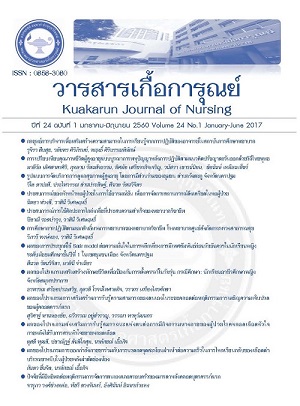ผลของโปรแกรมเสริมสร้างทักษะชีวิตเพื่อป้องกันการตั้งครรภ์ในวัยรุ่น กรณีศึกษา นักเรียนอาชีวศึกษาหญิง จังหวัดสมุทรปราการ* The Effect of Life Skills Program to Prevent Teenage Pregnancy: A Case Study of Female Vocational School Students in Samutprakran...
คำสำคัญ:
life skills, teenage pregnancy, female vocational studentsบทคัดย่อ
การวิจัยครั้งนี้เป็นการวิจัยกึ่งทดลอง มีวัตถุประสงค์เพื่อศึกษาผลของโปรแกรมเสริมสร้างทักษะชีวิตเพื่อป้องกันการตั้งครรภ์ในวัยรุ่น โดยเปรียบเทียบคะแนนทักษะชีวิตทั้ง 3 ด้าน คือ พุทธพิสัย จิตพิสัย และทักษะพิสัย กลุ่มตัวอย่างได้แก่นักเรียนอาชีวศึกษาหญิงที่มีอายุ ระหว่าง 16-18 ปี กำลังศึกษาอยู่ในระดับชั้นประกาศนียบัตรวิชาชีพ ชั้นปีที่ 2 ภาคเรียนที่ 1 ปีการศึกษา 2558 ของวิทยาลัยอาชีวศึกษาแห่งหนึ่งในจังหวัดสมุทรปราการ จำนวน 84 คน แบ่งเป็น กลุ่มทดลอง 42 คน และกลุ่มเปรียบเทียบ 42 คน โดยกลุ่มทดลองได้เข้าร่วมโปรแกรมเสริมสร้างทักษะชีวิตเพื่อป้องกันการตั้งครรภ์ เป็นระยะเวลา 7 สัปดาห์ เครื่องมือที่ใช้ในการวิจัย ประกอบด้วย แบบสอบถามข้อมูลทั่วไป และแบบวัดทักษะชีวิตเพื่อป้องกันการตั้งครรภ์ในวัยรุ่น ซึ่งแบ่งออกเป็น 5 ส่วน คือ 1) แบบวัดคะแนนพุทธพิสัย ด้านความคิดวิเคราะห์ กับความคิดสร้างสรรค์ 2) แบบวัดคะแนนจิตพิสัย ในด้านความตระหนักรู้ในตนเองกับความเห็นใจผู้อื่น 3) แบบวัดคะแนนทักษะพิสัย ด้านการตัดสินใจกับการแก้ปัญหา 4) แบบวัดคะแนนทักษะพิสัย ด้านการสร้างสัมพันธ์ภาพกับการสื่อสาร 5) แบบวัดคะแนนทักษะพิสัยในด้านการจัดการกับอารมณ์ กับความเครียดวิเคราะห์ข้อมูลโดยใช้สถิติเชิงพรรณนา สถิติการทดสอบค่าที่เป็นแบบไม่เป็นอิสระต่อกันแบบเป็นอิสระต่อกัน
ผลการศึกษา พบว่า 1) ภายหลังการทดลอง กลุ่มทดลองมีค่าเฉลี่ยคะแนนทักษะชีวิตด้านพุทธพิสัย จิตพิสัย และทักษะพิสัย สูงกว่ากลุ่มเปรียบเทียบ อย่างมีนัยสำคัญทางสถิติที่ระดับ .05 2) ภายหลังการทดลอง กลุ่มทดลองมีค่าเฉลี่ยคะแนนทักษะชีวิต ด้านพุทธพิสัยจิตพิสัย และทักษะพิสัย สูงกว่าก่อนการทดลอง อย่างมีนัยสำคัญทางสถิติที่ระดับ .05
The objective of this quasi-experimental research aimed to study the effect of life-skills program to prevent teenage pregnancy. The three domains of life-skills that were cognitive, affective and psychomotor of the experimental group between before and after participating life skills program to prevent teenage pregnancy were compared. The three components life-skills between of the experiment group and the comparison group after experimentation were compared also. The studied samples were 84 female vocational students aged between 16-18 years who were studying in the first semester, the second year of certificate program, the academic year of 2015. The samples were assigned equally in to the experimental and the comparison group. Only the experimental group was required to engage in the life skills program to prevent teenage pregnancy for 7 weeks. The research tool was done through 1) A questionnaire for general characteristics. 2) A questionnaire for life skills to prevent teenage pregnancy divided into 5 parts 1) Scores on cognitive domain the part of creative and critical thinking. 2) Scores on affective domain the part of self-awareness and empathy. 3) Scores on and psychomotor domain the part of decision making and problem solving. 4) Scores on psychomotor domain the part of interpersonal relationship skills and effective communication. 5) Scores on psychomotor domain the part of coping with emotion and stress. Research findings were analyzed using descriptive statistics, Independent t-test and dependent t-test.
Results of this study showed that:
1. After the experiment, the experimental group had higher life-skills mean scores on cognitive domain, affective domain, and psychomotor domain than of the comparison group with a statistical significance level of .05.
2. After the experiment, the experimental group gained better life-skills mean scores on cognitive domain, affective domain, and psychomotor domain than before the experiment with a statistical significance level of .05

















